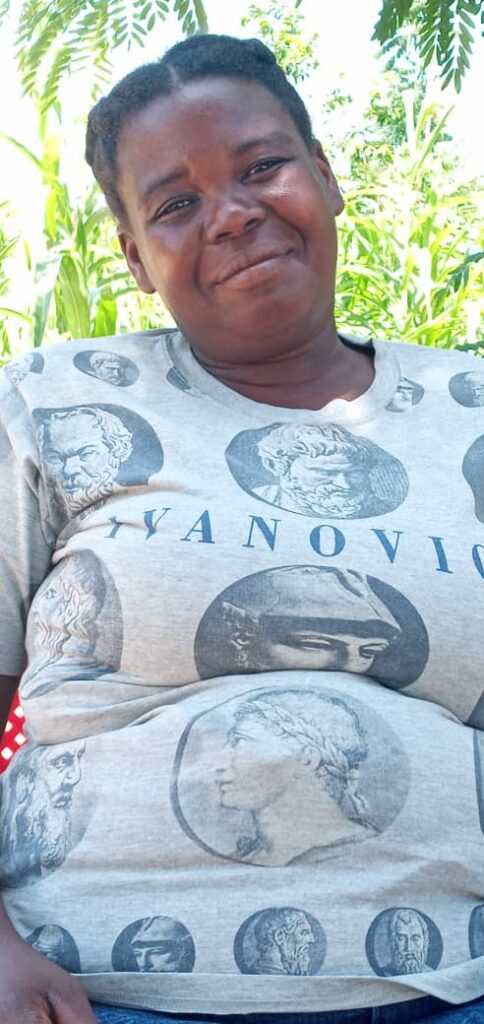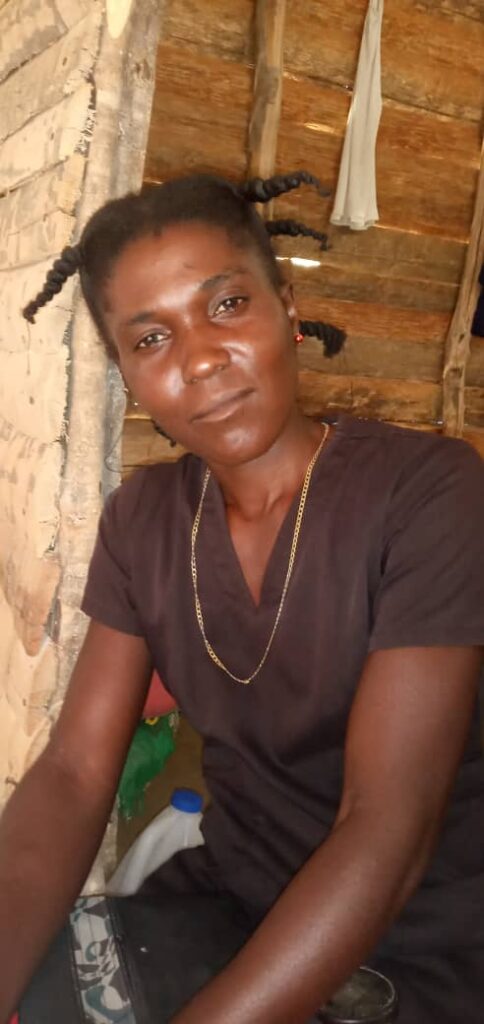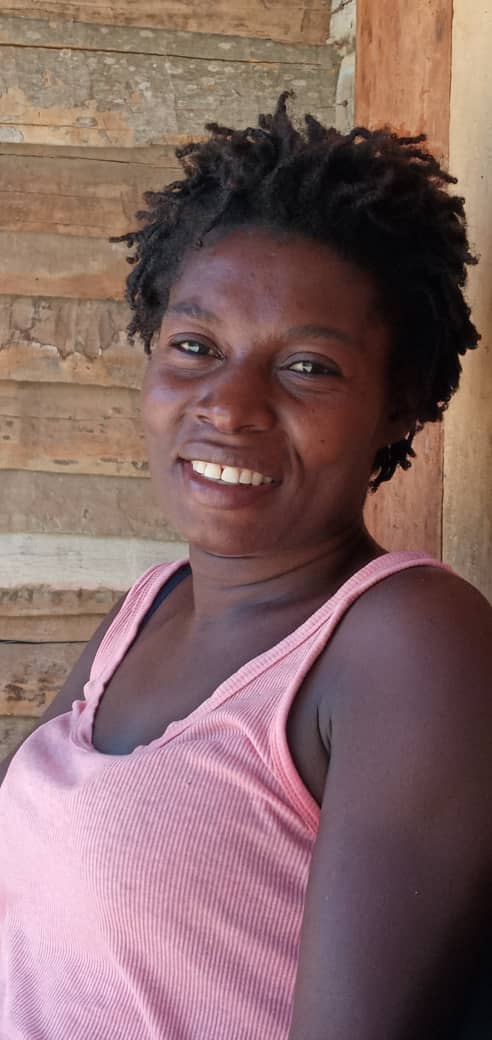Claudenise Pierre lives in a small house just before the Kashima intersection on the major dirt road that leads to Kas and back towards the Artibonit River. She shares her house with her two children and a young cousin. “My cousin really just sleeps here. He leaves in the morning and spends the day doing any work he can find in the neighborhood.”
She returned to Haiti with her children a few years ago. They had been living with the children’s father in the Dominican Republic. He’s successful auto and motorcycle mechanic, but Claudenise decided to leave him while pregnant with their second child because of frequent abuse. “He would drink, and when he drank, he hit me.”
She went back to the shack that the family had abandoned when they moved to the DR. She did what she could to enclose it. “I wove walls out of straw and palm leaves. I covered holes with dried mud. I did what could.” She asked her cousin, then in his late teens, to sleep in the house with her and the children because she was afraid to be alone with them. She fed the children and sent her older child, the girl, to school by doing odd jobs, like shelling peanuts, sorting charcoal, or laundry. Keeping her daughter in school wasn’t easy. “I sent her, but sometimes she went hungry. I couldn’t give her anything to eat in the morning before she left. I didn’t have even five gourds if she wanted a snack.”
Everything changed for her after she joined the CLM program. She chose goats and a pig as her two enterprises. Like most families in the area where she lives, she lost her pig. It had begun growing well, however, and she was able to sell the meat for 5000 gourds. She used that money to buy peanuts, which she planted. She’s hoping to harvest them in August.
She had much better luck with her goats. Fonkoze gave her two females, and now she has seven. “I would have nine. One of my females just gave birth to two still-born bucks.”
She wants to continue keeping goats because they give her a way to ensure that she can always keep sending the children to school. In fact, the seventh goat was her own purchase.
The goats do not, however, ensure steady income. She cannot sell a goat to buy food every day or even every week. So, Claudenise wanted to start a small commerce as well. Small commerce was new for her, but her case manager encouraged her. She took money she saved from her weekly CLM stipend, and bought what she needed to begin selling peanut butter on bread or kasav, which is a Haitian flatbread made from manioc, in front of a nearby clinic. She also sells groceries.
Together, her various products are keeping the family fed and allowing her to grow. She saved money through the first year-long cycle of her savings and loan association. When that cycle ended, and a new one was ready to start, she decided to save with three separate memberships. Two are for her, and one is for her girl. She plans to buy a cow with the money she’ll save in her two shares, and her daughter’s share will help her ensure that the girl always has what she needs for school.

Nicole Olman lives with her partner and their two younger children just down the road from Claudenise. Her older boy, now just 16, left home earlier this year to seek work in the Dominican Republic.
When Nicole joined the CLM program, she was struggling. “I didn’t have anything, anything at all. The day the supervisor first came to my house, I was barefoot. I had bought sandals for my children, but I didn’t have money left over to buy them for me.”
The children’s father went around doing odd jobs for the family’s neighbors, but Nicole had no income herself. “I was just sitting there.”
When she realized that she might have a chance to join CLM, she was delighted. The program had already worked with other families nearby, so when they came by her house to ask questions, she knew what it was about. “I was so happy. I told them I didn’t have anything. That they could ask around. If anyone told them I owned stuff, it was just to keep me from the program.”
Like Claudenise, Nicole chose goats and a pig, and like Claudenise, she had no luck with the pig. “My first one died. Then I bought a second one and it died, too.” And also like Claudenise, she’s done better with her goats. She now has ten.
Much of her progress has depended on a small commerce she started with money she borrowed from her savings and loan association. She initially tried selling basic groceries — rice, flour, oil, sugar, and the like — but it didn’t work well. Too many people would buy on credit. So she switched to seasonings and moved her business to the local markets. She sells garlic, leeks, bouillon cubes, hot peppers, onions, etc. She goes to Kas on Mondays, and to Tomond on Thursdays. “People don’t expect to buy seasonings on credit, and everything you sell at the market is for cash.”
The business is profitable. It enables her to keep her family fed and to save money too. Every Monday, she contributes 1000 gourds to a savings club at the Kas market. When it’s her turn to collect, she’ll get 10,000 gourds. She plans to use 5000 to buy another goat and pour 5000 into her business. She also saves 750 gourds each week in two savings and loan associations. At the end of the associations’ year-long cycles, she plans to buy a second cow.
Things have accelerated for Nicole in recent months for a reason she did not anticipate. She was unhappy when her boy left for the Dominican Republic. He didn’t tell her he was going, having called her to let her know where he was only after he arrived. But he’s been sending money back to her since he first got there. “It isn’t always a lot, but he always sends something.” He’s doing really well. Much of what he sends is just to help her support the household, but he’s begun sending back larger sums as well, trusting her to invest for him.

Mirana Mauricette and her five boys live in Osedi, much farther off the main road than Nicole and Claudenise. It is a hike down a narrow path, along peanut fields and across a narrow ravine, from her home to the the secondary road that branches of the road to Kas in Kashima. Her youngest children, twins, are almost nine, and she hasn’t seen or heard from their father since he left for the Dominican Republic shortly after they were born. She’s had to raise and to support her children on her own.
Before she joined the CLM program, she managed to do so through a small business. Her mother’s cousin has a bakery in nearby Tyera. Five days each week, he would sell her 250 gourds of bread on credit, and she would carry it around her neighborhood, selling it from a basket on her head. She would bring him the money in the afternoon, after she finished her sales, and she would have 250 gourds for herself and her kids. When the CLM selection team came by her home in late 2019, her kids were evidently hungry.
The two goats that CLM gave Mirana are now nine, and she bought a second small boar to raise alongside the one the program gave her. Like the other women, she hopes to keep raising goats because they offer a convenient way to make sure she has funds to keep her kids in school. “The kids have to go to school. They have to keep making progress.”
Like the other two women, being able to build a small commerce has been more important than her livestock, as important as that is to her as well. She got started by using 2500 gourds she saved from money Fonkoze gave her to buy a tree. She turned the tree into charcoal, and it was enough to yield four loads.
When it was time to sell it, she told her case manager, Islande, that she wanted to take it to Pòtoprens. She knew she could get a better price. “Islande asked me whether I knew Pòtoprens, and I said that I didn’t. But she encouraged me to give it a try, and I sold the charcoal for 8000 gourds.
She invested that money in another business. Each Friday, she crosses the border into the DR, and takes a truck to the international market between Beladè in Haiti and Elias Piña. She buys housewares — like curtains, sheets, towels — but also clothes. Then she brings them back for sale at the markets in Kas and Tomond. The business is flourishing. She already bought a cow and a large hybrid billygoat out of her profits. She hopes the latter will improve her stock of animals.
When asked how she has made so much profit so quickly, Mirana credits her case manager. “She taught me to save money. I used to just spend everything I made. Now I know that, even if I have just five gourds, I can’t spend all of it.”
But she describes a second, perhaps more important, kind of help that Islande provides. She says that she’s always had business ideas. And every now and then, she’s had some money she could invest. But she’s always hesitated. Before she could decide, the money would have melted away. She was managing a lot of expenses. Islande provided encouragement she had never found anywhere. As soon as she has means, she can share her idea with Islande, and she quickly makes her investment.
And she’s determined to continue to make progress. Even though she won’t have Islande’s weekly visits anymore, she’s confident that she can. “I won’t go back to what I was. I have to be both mother and father to my kids.”
She’s planning to use her savings and loan association to save to buy another cow next year. The one she has is pregnant, so she could soon have a small herd. And she’s getting ready to return to work on the home that she built with the program’s help. “It’s made of palm wood. I don’t want to wait for it to collapse on me. I’ve been following the price of cement, and I’m beginning to collect rocks.” She hopes to replaces the wooden walls with ones of stones and blocks, and to cover the floor with cement soon.
